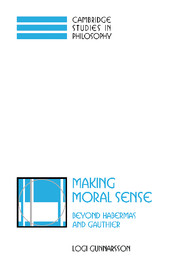Book contents
- Frontmatter
- Contents
- Preface
- PART I PROBLEMS
- PART II AGAINST RATIONALISM
- 6 Gauthier's contractarianism
- 7 From here to pre-social agreement
- 8 Habermas' discourse ethics
- 9 Discoursing about discourse
- PART III FOR THE SUBSTANTIVE APPROACH
- PART IV FOR PARTICULARIST SUBSTANTIVISM
- Appendix Transcendental vs. universal pragmatics
- Bibliography
- Index
6 - Gauthier's contractarianism
Published online by Cambridge University Press: 22 September 2009
- Frontmatter
- Contents
- Preface
- PART I PROBLEMS
- PART II AGAINST RATIONALISM
- 6 Gauthier's contractarianism
- 7 From here to pre-social agreement
- 8 Habermas' discourse ethics
- 9 Discoursing about discourse
- PART III FOR THE SUBSTANTIVE APPROACH
- PART IV FOR PARTICULARIST SUBSTANTIVISM
- Appendix Transcendental vs. universal pragmatics
- Bibliography
- Index
Summary
In this part of the book, my aim is to argue that the rationalists' conclusions do not follow from their premises. In this chapter, I outline Gauthier's position, and in the next I criticize it. I shall argue that Gauthier's utility maximization conception of rationality is too thin to demonstrate the rationality of his method for justifying moral principles. I then lay out Habermas' views in chapter 8 and argue against them in chapter 9. The expository chapters 6 and 8 are necessary background for the comparative argument in favor of the substantive approach to be presented in Part III. However, those readers who are only interested in this argument could skip the critical chapters 7 and 9.
THE MORAL ALTERNATIVES PROBLEM
In the first chapter, I distinguished between the basic choice problem and the moral alternatives problem. In this section, I shall further elaborate on these problems as they pertain to the sense of justice. Since my criticism of Gauthier will be confined to his solution of the moral alternatives problem, I shall also explain the importance of solving this problem. I start by discussing how Gauthier understands the sense of justice.
According to Gauthier, justice concerns the distribution of the benefits of human interaction. Justice requires that the benefits be so distributed that each receive her due.
- Type
- Chapter
- Information
- Making Moral SenseBeyond Habermas and Gauthier, pp. 53 - 70Publisher: Cambridge University PressPrint publication year: 2000



